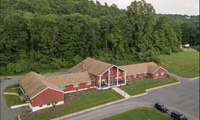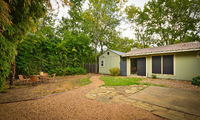New Jersey Drug and Alcohol Rehab

New Jersey is not unlike other places in the U.S. when it comes to drug and alcohol issues. A survey found that 203,000 New Jersey individuals ranging from age 12 and above binged on alcohol in a one-month period, accounting for about 19.2 percent of all people surveyed in this age range.
While these numbers are concerning, the state of New Jersey also hosts a number of addiction recovery centers and luxury facilities that are ready help you on your road to sobriety. It's a coastal land carrying a rich legacy, a huge and diverse population, and tons of urban and natural scenery—hence the nickname, "Garden State." If you reside in the area or are searching for a crisp and lively environment to get sober, you have a variety of options here.
Discovering Your Own Addiction
Drug and alcohol addiction affects millions of Americans annually, and it is no respecter of persons. It can affect anyone regardless of age, gender, or status. While addiction is medically and scientifically classified as a disease, many people still regard it as simply a character flaw that is easily remedied through lifestyle changes alone. This, of course, is not only erroneous but sets a dangerous precedent of shaming those who have fallen victim to such a debilitating disorder.
Addiction affects the brain through chemical alteration, thus changing a user's psychology and personality negatively. It is therefore a challenge that's not easily overcome by simply adopting schools of thought, but rather with medical and psychological care.
And at the tip of most addiction recovery plans, you'll find a person who has admitted that their drinking or drugging has gotten out of hand. Here are a few questions to help you realize whether or not you have become dependent on substances.
- Have you made an attempt to quit alcohol or drug use and failed?
- Do you put off important duties to drink or use?
- Has a family member or friend expressed concern about your substance use?
- Do you experience thoughts of alcohol or drug use while you're at work?
Answering yes to one or more of the question above could be an indication of a substance abuse problem.
New Jersey Alcohol and Drug Rehab
Because alcohol doesn't require a prescription and is purchasable "over the counter," it leads some to believe that it is safer than physician-ordered narcotics. On the other hand, others form the opinion that prescription medication is somewhat OK because it came from a doctor. However, the truth is that alcohol and drugs are both dangerously addictive substances that produce long-term harm in the body and mind.
Rehab facilities treat addiction in several ways, but the first line of treatment is usually detox. During a drug or alcohol detox program, poisonous substances are removed out of your blood through carefully-monitored procedures conducted by certified medical professionals. Detox can also help your body have a much needed "time out" from your substance/s of choice. You'll be able to go through withdrawal symptoms in a controlled, medically-supervised environment, and gain new coping and relapse prevention strategies.
In terms of settings and structure, rehabilitation programs vary. But in most cases you can expect activities such as group therapy sessions, individual counseling, psychotherapy, and relapse prevention planning.
Residential and Outpatient Addiction Treatment in New Jersey
Rehab programs—both outpatient and residential—take a considerable amount of time to complete. This typically means days to months. Realistically, the National Institute on Drug Abuse (NIDA) recommends patients to spend at least three months to achieve full recovery.
Residential treatment requires you to stay full time at a facility while in recovery. Outpatient programs, on the other hand, gives you the freedom of staying at home, and you can continue your normal routine between sessions. Here are some of the key differences and similarities between inpatient and outpatient addiction care.
Full Immersion vs. Less Commitment
Residential facilities provide patients intensive care but are aren't yet ready to engage with groups of people. The focus primarily on you, and you'll enjoy the benefits of working through program made specifically for you. No need to worry about anything else; just you and your road to a more fulfilling, sober life.
Outpatient programs give you flexibility; you can maintain all of your responsibilities like work and childcare and still travel recovery road. These types of centers usually only require about 10 to 12 hours of medical treatment every week. It's a great option for those who aren't able to commit to living in a facility exclusively.
Round-the-Clock Care vs. Care As-Needed
As with every program, detoxification is essential to giving you the best chance at sobriety. As such, it is crucial to be properly monitored at all times during this process. Ridding your body of toxins isn't an easy feat. For residential centers, you can rest assure knowing that you are in great medical hands ready to serve you every step of the way.
If you're unable to commit to a long-term intensive program, outpatient programs require you to regularly visit your hospital or other medical center for periodic physical and mental evaluation during this phase. These programs invest time in drug abuse education and counseling, and are fantastic options for long-term treatment.
Holistic Approach
Drug abuse takes a toll on the body, but it doesn’t make who you are. You are more than sum of all your choices. Remember that you are someone special to somebody, whether it is your mother, father, siblings, significant other, etc. Despite possibly having other physical or mental disorders, it is who you choose to be that makes you such a powerful force in the lives of others. Hence why residential rehabs make it their mission to build upon your entire well-being.
Outpatient facilities take a similar approach, but use daily or nightly meetings to help you maintain your normal schedules, as well as counsel you individually as best as they can to give you the most optimal outcome.
New Jersey Addiction Rehabs that Specialize in Mental Health Issues
Substance abuse and mental health are not mutually-exclusive, so dual diagnosis is incredibly important to helping you achieve your full recovery. Of course, since it’s not always easy determining which requires more attention – your mental health or substance use, dual diagnosis programs examine them both concurrently. This is ultimately the best way to ensure restored health and long-term sobriety.
According to the National Institutes of Health (NIH), patients who struggle with co-occurring mental disorders have better result when they enroll dual diagnosis treatment programs.
These types of programs require you to complete treatment programs for your mental health along with substance use. This ranges from dual diagnosis therapy to recovery groups, along with family programs, individual counseling, and other therapeutic services.
If you've been formally diagnosed with a mental health condition and are seeking treatment for substance use disorder, you'll need to make an appointment with a mental health rehab or alcohol and drug counselor to discuss your recovery goals and mental health history to determine what next step is right for you and your recovery.
Paying for Addiction Rehab
Just like any treatment program, the cost of a rehab treatment will vary based on the amount of hours you're recommended to complete. Other factors include amenities, insurance funding and the type of program itself.
Before you get started, it's important to talk with your treatment center about payment plans or other options they may have available. Some residential treatment programs are covered by insurance or by a state's consolidated fund, while others require either a partial or full out-of-pocket payment. Inquire about insurance, statewide consolidated funds, or a scholarship program for free or subsidized treatment.
No matter which option you choose, you will be among others learning to cope from drug and alcohol addiction as well. And it is this sort of community that not only helps you overcome loneliness and isolation, but make wiser choices when it comes to your circle of friends. Remember, the journey to your recovery starts with one step. Browse our directory of New Jersey treatment programs or call 800-772-8219 to inquire about your recovery options.










